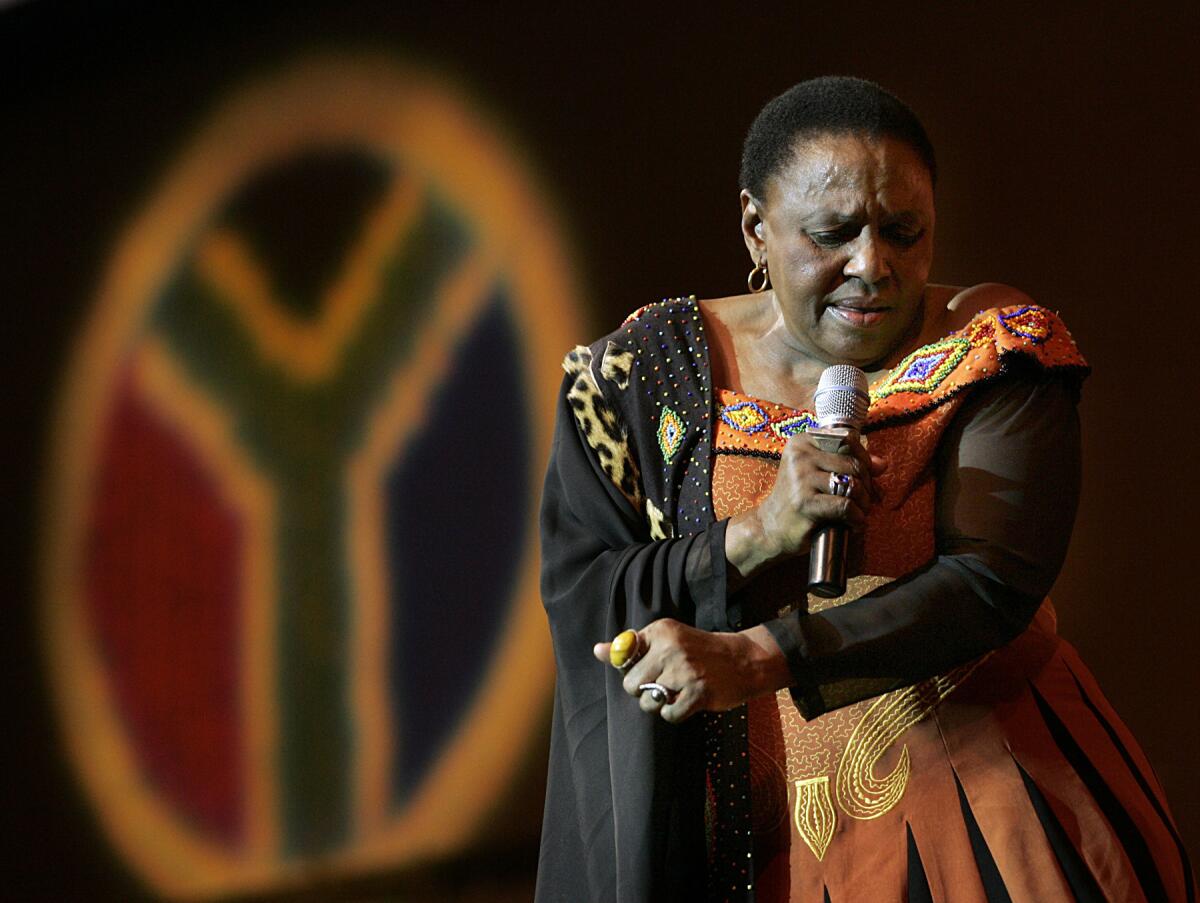Miriam Makeba dies at 76; South African singer spent 31 years in exile

- Share via
Miriam Makeba, the South African singer who for more than half a century brought the intricate rhythms of her native land to millions of listeners around the world and whose role as a spokeswoman against apartheid subjected her to 31 years of exile, died early Monday after a concert in Italy. She was 76.
Makeba apparently suffered a heart attack after performing onstage for about 30 minutes. She died shortly afterward at a private clinic near Naples, according to an Italian news agency report. A funeral will be held in South Africa.
“Her haunting melodies gave voice to the pain of exile and dislocation which she felt for 31 long years,” former South African leader Nelson Mandela said in a statement issued by his foundation. Citing her nickname, “Mama Africa,” he added: “She was a mother to our struggle and to the young nation of ours.”
Makeba captivated audiences with a voice perfectly suited to the polyrhythmic chant-songs of African music, combining the clarity of a Joan Baez with the throaty authority of a Sarah Vaughan. Her fame in the U.S. peaked with the 1967 release of the single “Pata Pata,” an upbeat dance tune that remained her best-known number to the end of her life. The song became the first top-20 U.S. single by an African artist.
By then she had already won international fame with a novelty number known familiarly as “The Click Song,” for the way it incorporated the distinctive “click” sound of her native Xhosa tongue.
It was a reflection of troubled times that her career became identified with politics, first through her banishment in 1960 by the white apartheid regime of South Africa, and then through her 1968 marriage to the black American radical Stokely Carmichael.
After she and Carmichael toured Cuba, her American bookings evaporated and her U.S. recording contracts were canceled. “My manager said people weren’t going to feed the hand that was going to slap them,” she told The Times in 1988. “They saw my husband as a threat and me as a threat because I was married to him.” But she insisted that her political protests were directed at South Africa, not the U.S. government.
The couple settled in Guinea at the invitation of President Sekou Toure, and divorced in 1978. Carmichael died in 1998.
Born in Johannesburg in 1932, Makeba began performing in her teens, eventually singing with the Manhattan Brothers, one of the country’s top bands. When Harry Belafonte caught her appearance in the 1958 documentary film “Come Back, Africa,” he invited her to join him on a world tour. The tour, which included her debut appearances on “The Ed Sullivan Show” and the “Tonight Show” with Steve Allen, launched her international career.
But her outspokenness from the stage also exposed her to retaliation from the South African regime. During a four-week trip to the U.S. in 1960, she reported to the South African Consulate in Chicago to renew her passport. Instead, she watched in shock as the consul stamped her passport “Invalid,” signifying that she was forbidden to re-enter her country.
She did not return until 1990, before the actual turnover of power to South Africa’s black majority, but after such dramatic events as Mandela’s release from imprisonment on the notorious Robben Island. Two years later she resettled in her home country permanently.
In the interim she became one of the world’s best-known political activists. It was a label she occasionally resisted but could not entirely avoid. In 1963, during an appearance before the United Nations Special Committee on Apartheid, she called for a boycott of South Africa; the regime responded by banning her records.
In an autobiography published in 1987, she told of the murders of family members by the white minority regime, of her teenage marriage to a violent husband, and of the mental illness and death of her daughter Bongi.
Her more eloquent testimony came through her performances. She often toured with other dispossessed South African musicians, including the trumpeter Hugh Masekela, to whom she was briefly married.
In the 1980s she performed with Paul Simon on his “Graceland” tour, which gave many South African performers international exposure. She also appeared with Simon in 1992, when his tour of South Africa became the target of protesters who contended it was premature, given that the hand-over to black rule had not yet become official.
Makeba made numerous visits to Los Angeles, including a “farewell” appearance in 2005, when she was 73, at a World Music Festival in West L.A. She also appeared in a key role in the 1992 film version of the musical “Sarafina!,” which told the story of schoolchildren involved in the Soweto riots.
Appearing before a throng of journalists in Johannesburg shortly after her return home in 1990, she tried to express the internal conflicts she felt at having been made into a symbol of political resistance.
“I’m not a politician; I am a singer,” she said. “Long ago, they said, ‘That one, she sings politics.’ I don’t sing politics; I merely sing the truth.”
Hiltzik is a Times staff writer.
More to Read
Start your day right
Sign up for Essential California for the L.A. Times biggest news, features and recommendations in your inbox six days a week.
You may occasionally receive promotional content from the Los Angeles Times.







